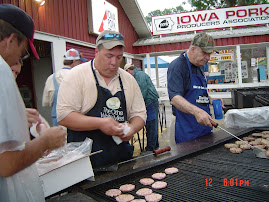Thanks for the report on U.S. Trade representative Ron Kirk's recent Q and A with the LA Times Editorial Board. He discussed very little due to his observation that TRADE TALKS ARE DONE IN SECRET. He also referred to the North American Free Trade Agreement as an EXTRAORDINARY SUCCESS. He felt their might be environmental and labor issues that need to be discussed with Mexico.
I recently returned from a trip to Iowa where I had an opportunity to talk with farmers and voters concerned about free trade in Agricultural products. Although my comments are limited for farm products, I agree with Iowans that free trade matters must be fully disclosed to the American farmer and agricultural voters.
Recently, NASDA listed concerns with regard to NAFTA and they were far less cursory than mayor Kirk's comments to the LA Times Editorial Board. They are listed below and confirm the need for FULL DISCLOSURE TO THE AMERICAN AGRICULTURAL COMMUNITY;
PARTIAL LIST OF CURRENT AGRICULTURAL TRADE ISSUES WITH CANADA and MEXICO
PARTIAL LIST OF CURRENT AGRICULTURAL TRADE ISSUES WITH CANADA
Potatoes
The U.S. has been seeking approval to ship potatoes to Canada in bulk for processing. Canada mandates different disease testing procedures than those used on our side of the border. Canadian Food Inspection and AMS have agreed to meet with interested State and Provincial representatives on the testing issue in the first quarter of 1999.
Seed certification
Differences between U.S. and Canadian rules impede trade, and it was agreed in the December 2 agricultural trade understanding to work on this problem. However, no mechanism has been established to do so.
Pesticides
Canadian and U.S. standards differ, and product pricing is not uniform, even after adjusting for the exchange rate. The U.S./Canadian understanding calls for an effort to assess the differences and move towards harmonization. USDA is organizing meetings on this subject.
Veterinary chemicals
U.S. farmers are concerned about residues in animals imported for slaughter in the United States, and about the possibility of "extra-label" uses of approved chemicals.
Dairy marketing
The United States is taking Canada to the WTO over subsidy elements in provincial dairy marketing arrangements.
Grain marketing
Non-transparency of Canadian Wheat Board operations, and monopoly aspects of its marketing arrangements, remain a major area of dispute between the two countries. Canada has moved slowly on recognizing U.S. states as free of Karnal bunt.
Forest and nursery products
Canadian plant quarantine rules in relation to pine shoot beetle have been a barrier to trade for nearby states.
PARTIAL LIST OF CURRENT AGRICULTURAL TRADE ISSUES WITH MEXICO
Pre-clearance programs
The cost of pre-clearance inspection by Mexican officials in the United States is a burden on apple shipments from the two states that export to Mexico, and an insurmountable barrier for the rest. Mexico has proposed pre-clearance as a requirement for citrus exports from Florida.
AI Certification for poultry
Mexican rules requiring assurances of the absence of low-pathogenic avian influenza threatens an immediate closing of exports of many if not all poultry products.
Meat grading rules
Regulations in two or three states in northern Mexico operate as disguised barriers to trade, effectively blocking the export of U.S. beef.
Border infrastructure
Bottlenecks and red tape have a major impact on the flow of U.S. agricultural exports into Mexico. Some products can cross at only one location (e.g., swine). AMS has been conducting a Long Term Transportation Study which addresses some border issues, and there is funding in the recent Transportation Bill which could be used on border infrastructure.
Meat anti-dumping
Both pork and beef are potentially affected by anti-dumping cases brought by Mexican producer interests.
Grain testing rules
U.S. grain is imported with exceptions to published rules which are not, in the view of some USDA specialists, entirely based on sound science. The rules continue to be a source of concern.
Private commercial disputes
AMS is working with Mexican officials and the private sector on a Trade Dispute Resolution Commission on an arrangement like PACA to permit the fair settlement of disagreements affective fruit and vegetable trade. This might be expanded to cover other products as well.
Seed potatoes
Mexico accepts potatoes from Canada, but has yet to approve a protocol permitting seed potato imports from the United States.
Early warning on trade issues
USDA is putting together a proposal for a Consultative Committee which would address trade issues before they became major conflicts. There might be a role for state agricultural officials in advising or providing other systematic input within this structure.
ISSUES WITH TRILATERAL IMPLICATIONS
Biotechnology
Approval of genetically modified organisms for commercial planting is advancing at different rates in different countries, raising issues about border trade in seed (e.g., canola seed from Canada). "Nutriceuticals" are may be the biotech wave of the future.
Regionalization
Mexico has tended to insist on whole-state regions as far as plant pest status is concerned, although the United States has been willing to look at other defined geographical areas. Progress towards a common North American strategy on Asian Longhorn Beetle may point the way.
Pest risk assessment
There is a great shortage of resources to carry this out, as well as a lack of commonly-accepted methodologies. Under WTO rules, scientific risk assessments are the cornerstone of permissible quarantine and inspection protocols.
State-inspected meat products
The Administration proposes to permit interstate shipment of meat products produced under state inspection. This could have implications for trade with Mexico and Canada, both in relation to whether they would accept such products, and whether they might also seek similar changes in their respective inspection rules.
Organic foods
AMS will re-propose its rule within the next few months. Standards for "organic" food might be applied to food of non-U.S. origin, and certification of this food according to the U.S. standard is possible.
Country-of-origin labeling
This is the subject of a current GAO study. NASDA has supported labeling as a way of dealing with food safety issues. A related technical issue is that of tracing the movement of large animals.
Wildlife and disease transmission
Deer with TB, raccoons with rabies, and wildfowl with Newcastle disease do not seem to respect political borders. Control measures vary between countries, with substantial state responsibility and jurisdiction in the areas of wildlife management
The above concerns are listed from NASDA - WHO IS NASDA?
The National Association of State Department of Agriculture was founded in 1915.
Our mission is to represent the state departments of agriculture in the development, implementation, and communication of sound public policy and programs which support and promote the American agricultural industry, while protecting consumers and the environment.
NASDA is governed by a 10 member Board of Directors consisting of a five member Executive Committee; one At-Large member; and the presidents of the four NASDA regions.
Dr. Alan Phillips
Bloomington, IL
12.14.09
JOIN WITH ME IN STANDING ROCK SOLID BEHIND THOSE TRADITIONAL AND CONSTITUTIONAL VALUES THAT HAVE MADE AMERICA THE GREATEST NATION ON EARTH WATCH PART 1 AND PART 2 BELOW, DOUBLE CLICK ON BOTH
LISTEN
WWW
A REAFFIRMATION OF AMERICAN GREATNESS
U.S.Politics
Dr. Phillips Grilling

Iowa State Fair Pork Tent Pork Producers Assn
Mary Beth Phillips at Pork Tent

Iowa State Fair Pork Producers Assn
Dr. Phillips on Police Harley

Bandana Barbeque Springfield Missouri
A Great Farm Family, The John Preussner of Iowa

John, Julie, Ellie, Will and Luke